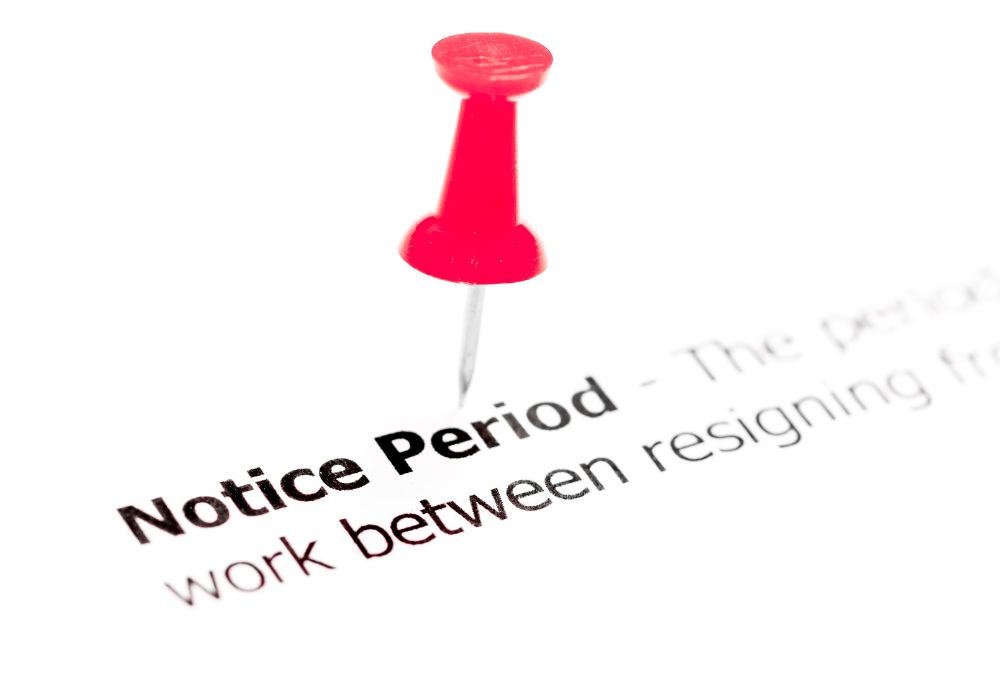First published on Friday, Jun 19, 2020
Last updated on Wednesday, Jul 10, 2024
In the world of workforce dynamics, notice periods are a crucial aspect of employee transitions.
As an employer, you're probably already aware of the importance of notice periods when it comes to managing your employees. But just in case you need a refresher, or if you're new to the game, we're here to break it down for you.
Understanding the ins and outs of employee notice periods is fundamental to managing your team effectively.
So, let's explore the realm of a typical notice period and the legalities associated with a notice period.
First things first, what exactly is a notice period?
Well, it's the period of time an employee must give their employer (or vice versa) before their employment ends.
A proper notice period is essential for maintaining a smooth transition from when an employee decides to leave your business or when you decide it's time to part ways.
This period of notice gives you time to find a suitable replacement, ensure a knowledge transfer, and wrap up any outstanding tasks or projects.
It’s a critical aspect of the separation process that helps both you and your employee move smoothly into a new role or structure.
The average notice period in the UK is one month, but how much notice an employee should give can vary from no notice to a few months. There are also certain laws you must follow in regard to notice periods.
What is the legal minimum amount of notice?
Under the Employment Rights Act 1996 there is a legal minimum amount of notice that you as an employer must give an employee before ending their employment contract. This minimum notice period is referred to as the statutory notice period.
Statutory notice periods require:
- No notice for employees who have been with your business for less than one month
- One week's notice for employees who have been with your business for more than a month, but less than two years
- Two weeks' notice for employees who have been with your business for more than two years
Notice periods then increase by one week for each year worked. This means a notice period can be anything from no notice to a maximum of 12 weeks.
It’s important to note that if this legal minimum notice is written in your employment contracts, your employee is contractually obligated to give the same amount of notice to you.

Typical notice periods
In the UK, notice periods can vary but here are the most common:
The statutory notice period
The legal minimum an employer must give—as mentioned above—is one week's notice for employees who have at least one month of service, and two weeks' notice if they have over two years of service.
Then the notice period will increase by one week every year until 12 years of service where the legal minimum would stay at 12 weeks' notice unless more notice is stated in their contract.
The contractual notice period
While the statutory minimums are a good starting point, many businesses have longer notice periods in place. It's not uncommon to see a longer notice period of one month's notice or more for a higher-level job role or for an employee with specialised skills.
A notice period can differ from one employee to another in their employment contract. How much notice you require your employee to give is up to you, as long as statutory minimum notice periods are complied with. It's best practice to have a clear and well-documented notice period.

Managing employee resignations
When an employee decides to resign, they should formally submit their notice. How they inform you should be set out in their contract and is typically in the form of a resignation letter, but you can decide what works best for your business.
They are also contractually required to work the amount of notice written in the contract.
However, if an employee requests to leave earlier than the last day that their notice period allows, it's advisable to discuss this with them and, if possible, come to a mutual agreement on the revised final day.
What to do if your employee resigns for a job with a competitor
If an employee decides to leave and their new job is with a competitor, it can create a conflict of interest. So, it might be practical to instruct them to avoid the workplace during their notice period.
For example, if a salesperson who is going to work for a rival company interacts with your customers, it may not be in your best interest to have them work during their notice period.
This practice is called garden leave, where your employee is still under contract but is not working. However, in order to place your employee on garden leave you must have a clause relating to garden leave in your employment contracts.
Find out more about gardening leave in our employers guide.
Pay during the notice period
During the notice period, employees are entitled to their normal pay, as well as any benefits. They can take annual leave during the notice period, and they will be paid for any annual leave that they have accrued but not taken by the termination date in their final pay.
You're not allowed to reduce their salary or benefits as a form of punishment.
An employee's notice pay can be affected if they are not able to work during their notice period due to various reasons, including:
- Being off sick
- Being on maternity, paternity, or adoption leave
- Being on shared parental leave
In some situations, you and your employee may agree that it would be best for them to work a shorter notice period or leave immediately without completing their notice.
So, it's important to clarify the terms and conditions of notice pay in your employment contracts to avoid any confusion or disputes.
The employer's notice to employees
Notice periods are not solely for when your employee resigns. You are also required to provide employees with a notice period if you decide to terminate their employment.z
The length of this notice should be determined based on the same factors as when an employee resigns—the employment contract and legal minimum notice period.
However, under certain circumstances, it is possible to dismiss an employee without providing any notice. This is only lawful if the employee has committed a serious breach of contract, which is known as gross misconduct.
Examples of gross misconduct include theft, fraud, and physical violence. In such instances, you may have the right to dismiss the employee immediately without any notice or pay in lieu of notice.
It's important to remember that you should always follow a fair and lawful process while handling allegations of gross misconduct to avoid an unfair dismissal. Because if you dismiss an employee unfairly, they could take you to an employment tribunal.
What is pay in lieu of notice?
When you terminate the employment without your employee working their notice period, it's referred to as a pay in lieu of notice. The employee is still entitled to be paid their notice along with their final salary.
This will immediately end the employment contract and relationship instead of after the statutory or contractual notice period. However, just like with garden leave you must have a pay in lieu of notice clause in your employment contracts, in order to use it.
Get help with BrightHR
Notice periods play a vital role in the UK employment landscape, ensuring a fair and balanced transition for both employees and employers. For employers, it's essential to be well-versed in the specifics of notice periods, both as defined in individual contracts and in accordance with legal requirements.
This knowledge is fundamental for maintaining a harmonious working environment and smooth workforce management.
Be sure to check the employment contract, maintain open communication, and treat your employees fairly during this time.
If you're unsure about your legal requirements regarding notice periods, it's in your best interest to consult an employment law expert. Especially if you find yourself in a position where you need to take legal action or if there has been a breach of contract.
BrightHR has the resources available to help, from BrightAdvice your own expert legal advice team—who are available 24/7—to our award-winning HR software.
Discover more and see for yourself how BrightHR can help by booking your free demo or call us today on 0800 470 2432.
And remember, every workplace is unique, so the specifics might differ, but being aware of these general guidelines can help you navigate notice periods with ease.

FAQs about notice periods
Do I have to let an employee work their notice period?
No, you don't have to if you don't want to. Instead, you can choose to pay in lieu of their notice period or place them on garden leave provided you have reserved the right to do this in their contract. If not, you'll need to obtain their agreement at the time for this otherwise it will breach their contract.
Can I make employees use outstanding holidays in their notice period?
Yes, you can ask employees to use their remaining leave. If they don't agree voluntarily, you can enforce annual leave as long as you give double the amount of notice for how long you want them to take.
For example, if you wanted them to take 3 days' holiday, you would have to give them 6 days' advance warning that they will be off on those days.
Do I have to give notice to employees on fixed term contracts?
No, you don't need to give notice if you are ending the contract on the agreed end date, although it's best to remind the employee in good time that this is due to happen. But, if you end the contract before the agreed date, you will need to give the notice that’s in their contracts, which should be at least the statutory minimum. Plus, if there is no provision for early termination in their contract you could be in breach of contract.
You could be in breach of contract if there is no provision for early termination in the contract.
If you have any more questions, why not ask BrightLightning?




